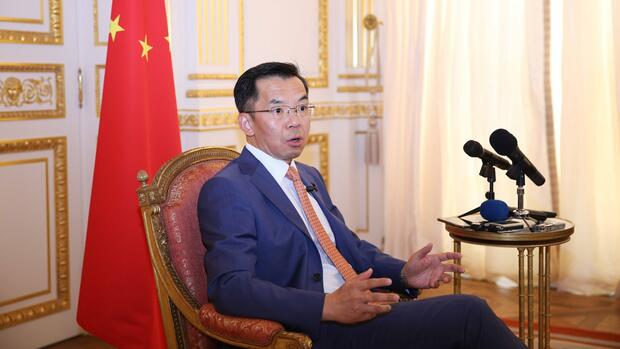China’s ambassador in Paris causes a diplomatic scandal.
(Photo: imago images / Xinhua)
Brussels One of the biggest obstacles to China’s diplomacy is China’s own diplomats: what was already evident in the pandemic is now also evident in the Ukraine war. Just when it looked as if Beijing’s efforts to convince France, one of the most important EU states, of a joint peace initiative, the Chinese ambassador in Paris sparked outrage across Europe – and embarrassed the French government.
In a television interview, Lu Shaye denied the states of the former Soviet Union sovereignty. The EU foreign ministers, who met in Luxembourg on Monday to discuss the Ukraine war, unanimously condemned Lu’s testimony. The Balts, who suffered under Soviet occupation during the Cold War, are particularly angry.
“Lithuania never joined the USSR. Moscow illegally occupied our territory and we resisted until we regained our independence,” Lithuanian Foreign Minister Gabrielius Landsbergis clarified.
The French government announced talks with Lu. One was “not very happy” about the statements, said European State Secretary Laurence Boone. An appointment at the Ministry of Foreign Affairs that was planned anyway should be used for the discussion.
Lu had questioned that former Soviet republics are full members of the world community: “These former USSR countries have no actual status under international law because there is no international treaty that establishes their sovereign status,” he claimed, in apparent contradiction to international law Location.
In Europe, Beijing’s tactics are failing
Lu is notorious for being a sharp-tongued hardliner. He represents a group of Chinese diplomats who are aggressively and nationalistically supporting the line of the Chinese state party. The “Wolf Warriors” want to gain international respect for China, but their tactics fail, especially in Europe.
It was the same during the Covid crisis, when China initially staged itself as an emergency responder, but then let the “Wolf Warriors” off the leash to suppress debates about the origin of the virus, which had first spread in Wuhan, China.
People like Lu are unintentionally “drivers of a more realistic China policy,” argues Thorsten Benner, director of the Berlin Global Public Policy Institute. “Because they destroy the illusion that China acts as the guardian of international law and is committed to peace in the world.” In this respect, Lu is in good hands in France, emphasized Benner – as a “counterbalance to the French President’s cosiness towards China”.
After his visit to China’s head of state and party leader Xi Jinping at the beginning of the month, Emmanuel Macron was confident that Beijing would act as a mediator in the Ukraine war, even though the People’s Republic is the most important supporter of the aggressor Russia internationally. Now Lu is shattering hopes of a constructive role for the Chinese and uniting Europe, which is at odds with China.
“The statements made by the Chinese ambassador to France are unacceptable, absurd and simply wrong,” said David McAllister, chairman of the EU Parliament’s Foreign Affairs Committee. China presents itself as neutral, but actually keeps the Russian economy running and “supplies Russia with goods that it no longer gets from others, but urgently needs for the illegal war of aggression against Ukraine”.
In Beijing, a spokeswoman for the Foreign Ministry tried to limit the damage: China respects the status of the former Soviet republics as sovereign states, she emphasized.
More: Russia wants to improve Chinese language skills among the population
